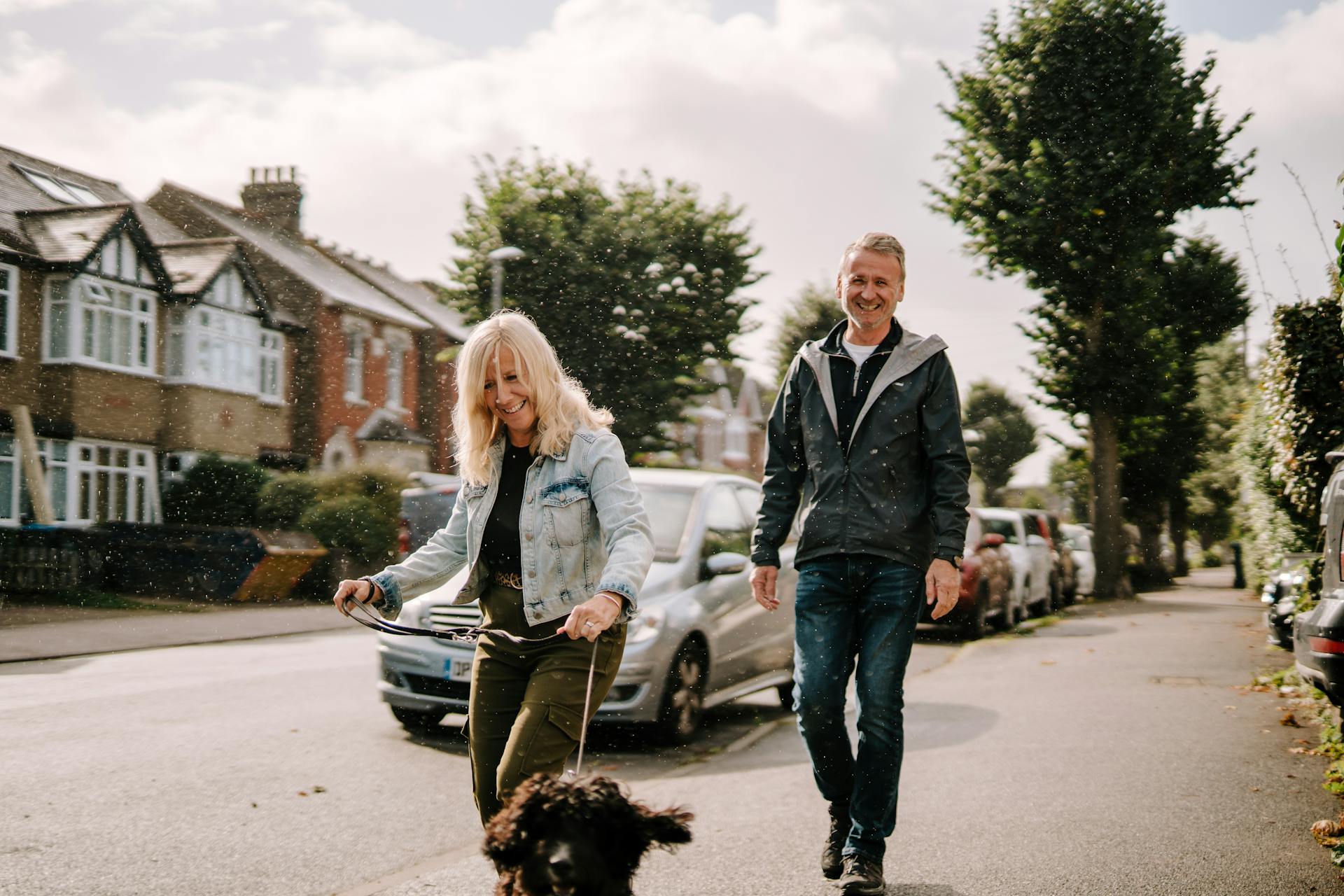
Living with a dog who has dementia can be overwhelming. The constant changes in behavior and environment can be challenging to navigate.
One thing to keep in mind is that dogs with dementia often have a reduced sense of spatial awareness. This means they may have trouble finding their way around the house or navigating stairs.
It's essential to create a safe and predictable environment for your dog. This can include removing hazardous items, securing loose wires, and blocking off areas you don't want them to access.
Changes in routine can also be difficult for dogs with dementia to adjust to. Try to stick to a consistent daily schedule for feeding, exercise, and playtime.
Dementia in Dogs
Dementia in dogs is a real thing, and it can be super challenging to deal with. Canine Cognitive Dysfunction, also known as "Old Dog Syndrome", is a condition that affects older dogs and is similar to Alzheimer's disease in humans.
Unusual night-time barking is a classic symptom of CCD, and it's not just about the barking itself, but also the underlying confusion and anxiety that comes with it. Dogs with CCD might seem lost, confused, or "out of it" for periods of time.
They might forget to eat, forget where the furniture is, or forget that they're supposed to eliminate outdoors. These can make a dog anxious, leading to barking episodes. Sometimes, they may simply bark at nothing at all.
Here are some common signs of CCD in dogs:
- Forget to eat or that they have eaten already.
- Forget where the furniture is, or what door he's supposed to use to go outside.
- Forget that they're supposed to eliminate outdoors.
- Be confused about where they are, or who you are.
If you can lessen your dog's confusion, you're likely to see a reduction in clinical signs, including strange or chronic barking behavior. You can try a few quiet words, some gentle TLC, or a quick trip outside to help calm them down.
It's essential to remember that CCD is a common condition in senior dogs, and there are things you can do to alleviate the symptoms. Dietary changes, behavior modification, lifestyle changes, and medications can all help.
Senior Dog Behavior
Senior dogs can exhibit a range of behaviors that might be attributed to dementia, including excessive barking.
Older dogs often have bodies that have seen a fair bit of wear and tear over the years, which can lead to joint pain and other health issues that might cause barking.
Confusion is a common symptom of Canine Cognitive Dysfunction (CCD), also known as "Old Dog Syndrome" or dementia in dogs.
Dogs with CCD might seem lost, confused, dazed, or "out of it" for periods of time, forgetting things like where the furniture is or what door they're supposed to use to go outside.
If your older dog is barking randomly, it could be due to a range of factors, including CCD, joint pain, or sensory decline.
Dogs with CCD may bark at nothing at all, or exhibit other anxious behaviors like pacing or whining.
If your dog's senses are deteriorating, they might bark excessively due to trouble seeing or hearing.
For your interest: Dog Barking at Other Dogs While Walking
For example, if your dog is having trouble with their eyesight, they might have trouble finding their way around at first, and may bark more loudly than normal.
To help your dog cope with sensory decline, you can try things like leaving a low light on where they sleep, or using a TV or radio to keep them company.
A warm blanket or a snuggle pal can also help your dog feel more comfortable and secure.
Here are some things you can try to help your dog with CCD:
- Sometimes just a few quiet words or some gentle TLC can help them settle back down.
- You may also try to figure out what things work to calm your dog, such as a handful of their favorite kibble or a special comfort toy or blanket.
- Give them a quick trip outside, even if they don't need to go, because the change of scene can sometimes short-circuit the barking cycle.
It's essential to work with your veterinarian to determine the underlying cause of your dog's barking and develop a plan to address it.
Managing Dementia
Signs of canine cognitive dysfunction syndrome (CDS) include pacing around at night, barking at thin air, house-soiling, getting lost in the yard, demanding to go in and out, and developing separation anxiety and noise phobias.
One in four dogs aged 11 to 12 years and two-thirds of dogs aged 15 to 16 years show at least one sign of CDS.
Research suggests that a new diet might help a senior dog stay sharp by adding nutrients that reduce oxidants and help clear them from the brain.
In one study, dogs fed senior food supplemented with antioxidants showed improvements in four categories of undesirable behavior after 30 days.
After 60 days, owners of dogs fed the supplemented food reported improvements in 13 of 15 target behaviors, compared to only 4 improvements in the control group.
Older dogs fed a supplemented diet performed significantly better on cognitive tasks, especially on difficult tasks and when learning new ones.
Antioxidants such as vitamins E and C, and nutrients like alpha-lipoic acid and L-carnitine, can help reduce oxidative damage to the brain and slow down the progression of CDS.
By making dietary changes, you can potentially improve your dog's quality of life and reduce the stress of caring for a dog with dementia.
A fresh viewpoint: How to Stop Prey Drive in Dogs
Articles About Dementia
Dogs with dementia can exhibit a range of signs and symptoms, including confusion, disorientation, and difficulty with learning and memory.
Canine Cognitive Dysfunction (CCD) is a common condition in older dogs, with Cricket's story being a prime example.
Dogs with CCD may experience changes in their sleep patterns, with some becoming more active at night and others becoming more sedentary.
Cricket's owner viewed her quality of life as more important than her age, and made the difficult decision to put her down.
Treatments for canine dementia are limited, but may include medication to manage symptoms, changes to the dog's environment, and a focus on maintaining a good quality of life.
Broaden your view: Dog Dementia Stages
Frequently Asked Questions
What is the final stage of dog dementia?
The final stage of dog dementia is characterized by frequent disorientation, leading to erratic behavior such as barking, pacing, and unresponsiveness to familiar commands. If you're concerned about your dog's behavior, learn more about the signs and stages of canine dementia.
Sources
- https://www.mumsnet.com/talk/the_doghouse/3751299-Older-dog-driving-us-mad
- https://www.dcurbanmom.com/jforum/posts/list/195310.page
- https://dogdementia.com/resources-senior-dogs-dementia/
- https://www.akc.org/expert-advice/health/dietary-treatment-for-canine-alzheimers-food-for-thought/
- https://seniortailwaggers.com/older-dog-barking/
Featured Images: pexels.com


